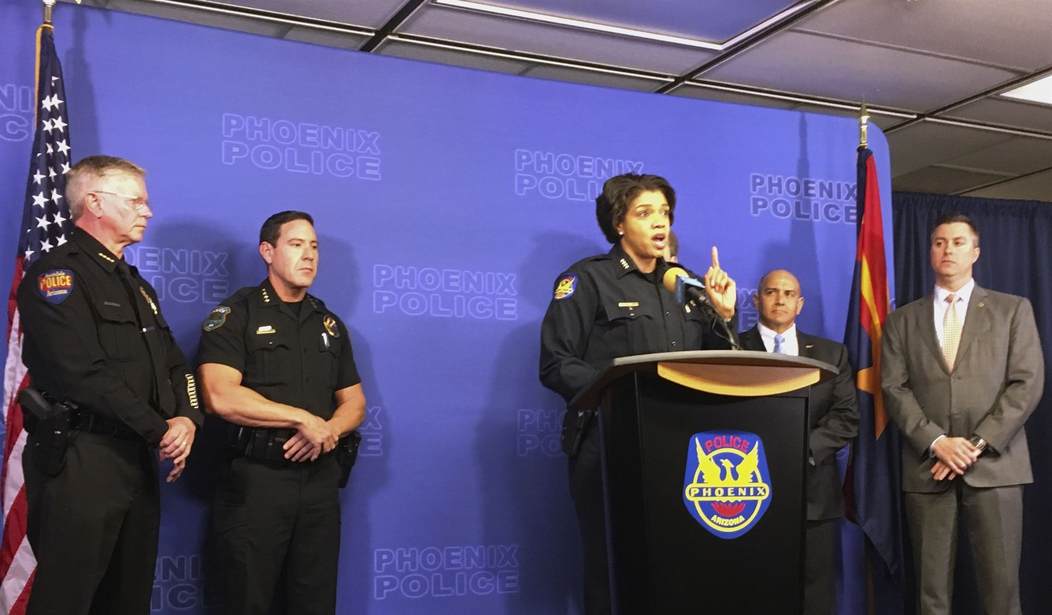On May 21, 2020, Officer Jeff Cooke of the Phoenix Police Department shot and killed Mr. Ryan Whitaker while responding to a domestic disturbance call at Mr. Whitaker's apartment in Phoenix, Arizona.
On July 15, 2020, the Phoenix Police Department released the 911 audio recordings from the incident, as well as edited snippets of video from two officers' body-worn cameras.
But it was not until the second week of August that the story started trending on social media. How is this possible in a time of unremitting police scrutiny?
Oh, I have not yet mentioned - Mr. Whitaker was white.
Due to the color of his skin, and because he is of the racial group that, as a matter of fact, is statistically more likely to be shot by police, mainstream media decided to ignore the politically-inconvenient story entirely. After all, it would not fit the "critical race theory" narrative that mainstream media have been formulating to fuel the anti-police BLM riots we're living through in prolonged disbelief today.
According to a 2019 research paper debunking the myth of systemic police racism published in the Proceedings of the National Academy of Sciences, after studying police shootings in context, researchers from Michigan State University concluded that they did not find evidence of anti-black bias in police shootings, but they did find "anti-White disparities."
I have not heard this anti-white police shooting disparity discussed in mainstream media, have you? I guess that story is queued in the same batch as Mr. Whitaker's.
Recommended
Mainstream media have been on a crusade since 2010 to stir up racial tensions, according to Zach Goldberg, a doctoral candidate at Georgia State University who has been researching the "Great Awakening," as he calls it. "What the evidence suggests, is that leading publications have not only vastly expanded the definition of racism and actively promoted a more racialized view of American society... but have done so, in part, by normalizing and popularizing the notion of 'white people's' collective guilt," Goldberg explains. This guilt is also known as "white privilege."
According to a research paper published in the Journal of Experimental Psychology: General, the consequence of "white privilege" education has been measured as reduced sympathy for white people. "Indeed, both studies revealed that while social liberals were overall more sympathetic to poor people than social conservatives, reading about White privilege decreased their sympathy for a poor White (vs. Black) person. Moreover, these shifts in sympathy were associated with greater punishment/blame and fewer external attributions for a poor White person's plight," the researches explained after conducting two studies of 1,189 participants.
You're well-aware of the names of black people killed by police. How about the white ones? Can you name any? There were indeed more white people than black people killed by police last year. And the year before that. And the year before that, and so forth. Are white people less deserving of media concern than black people when they are killed in a police encounter?
Zach Goldberg tallied and compared the number of news search results for unarmed white versus black police-shooting victims. "Black police-shooting victims generated nine times the number of news search results as white victims," he discovered, "32% of white victims generated zero search results."
In an interview with CBS last month, President Trump hit a nerve on this issue. "More white people" are killed by police than black people, he asserted, in response to the reporter asking Trump why black Americans were dying at the hands of law enforcement. CBS couldn't stomach Trump's assertion and responded in a blatantly biased article, insisting, "Black people were three times more likely to be killed by law enforcement officers than White Americans." The article ignored the context of the killings entirely and focused solely on race in an overt attempt to maintain the racist policing narrative, the leftist media's modus operandi. CBS showed absolutely no sympathy for the white people killed by police and refused to name any. Instead, CBS took the opportunity to prod at "white supremacy" and the Confederate flag, topics entirely unrelated to police shootings but which are known to stir up feelings of white guilt.
It is thus safe to guess why we have not heard of Mr. Whitaker's shooting by Phoenix police through mainstream media. The answer is a combination of the liberal media's diminished empathy for white men and the fact that the killing does not fit the racist policing narrative that they have been carefully crafting over the past decade.
Detestable race politics aside, was Officer Cooke justified in his use of force based on the evidence that has been released thus far? My next column will provide a detailed analysis of the shooting and explain why, in my opinion, it was justified.

























Join the conversation as a VIP Member